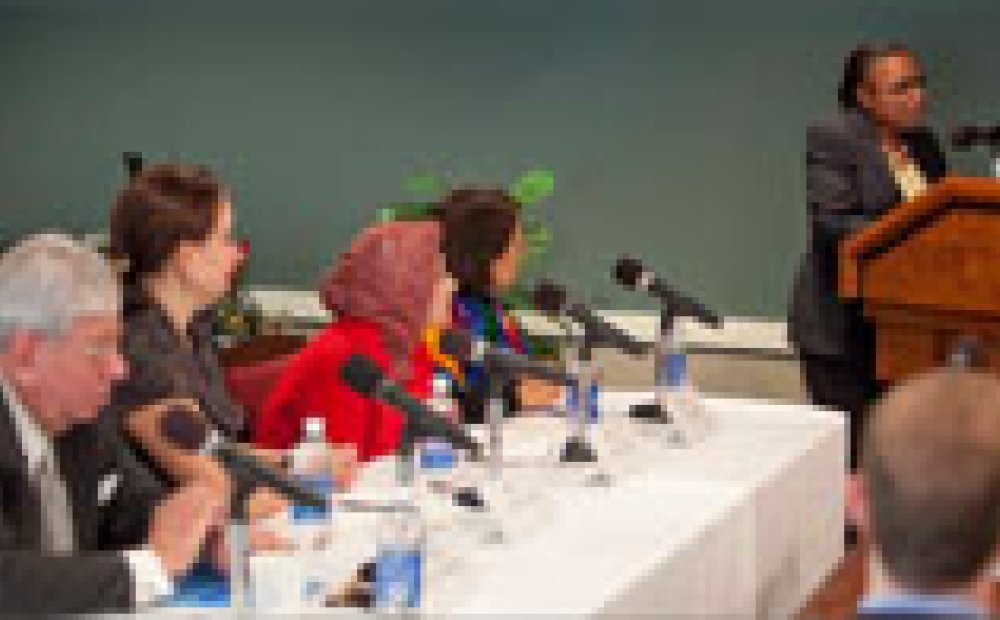Can Women Help Make Peace Agreements Sustainable?

The role of women in civil society and their involvement in peace negotiations has been notable, though women have often been overlooked as mediators in peace talks.
On January 20, 2011 the Middle East Program and The Institute for Inclusive Security (IIS) hosted a meeting, "Can Women Help Make Peace Agreements Sustainable?" with Luz Mendez, Member of the Advisory Council of the Global Fund for Women, Guatemala; Jacques Paul Klein, Former United Nations Secretary General's Special Representative and Coordinator of United Nations Operations, Liberia; Alice Nderitu, National Cohesion and Integration Commission, Kenya; and Suaad Allami, Director, Sadr City Women's Center and Legal Clinic, Iraq. Carla Koppell, Director of The Institute for Inclusive Security, moderated the event.
Mendez recounted her experiences at the negotiating table during the peace process that ended a 36-year war in Guatemala. She described the shift in that process, during which the United Nations went from observer to mediator once participants realized the original format was not producing results. Mendez emphasized the challenges she faced when trying to address women's rights concerns in talks, being the only woman present for four years of the five-year process. She described the satisfaction she felt when the UN moderator consulted her on the inclusion of women's rights provisions. Mendez also highlighted ongoing challenges in Guatemala, such as weak implementation mechanisms for the accords, the ubiquity of femicide, and the persistence of socioeconomic grievances.
Klein denounced the violence and hatred that often erupts when a state is too weak to implement the rule of law and is unable to turn its human capital into a source of strength. He described the prevalence of human trafficking witnessed throughout his career while he served the UN aiding victims in Bosnia-Herzegovina and Liberia. Klein described the programs implemented in those countries to rescue kidnapped and exploited women. He concluded by emphasizing the responsibility and ability that each individual has to foster tolerance and take action against violence and repression.
Nderitu reviewed the origins of ethnic tensions in Kenya, which erupted post-election in 2007-2008, as well as the role of women in the subsequent peace negotiations. She referred to the Kenya National Dialogue and Reconciliation agreements mediated by Kofi Annan, which involved women throughout the peace process. These agreements focused on ending violence and the humanitarian crises, and addressed longstanding issues such as poverty, inequality, and unemployment. Furthermore, Nderitu pointed out that the agreements creation commissions to address fundamental issues.Allami described the rise of the conservative movement in Iraq since the fall of Saddam Hussein, which has effectively limited women's rights and freedoms codified in the existing Iraqi personal status law. She stated that coalition forces in Iraq helped to limit this trend, but the situation was still contentious because Iraqi leadership tends not to work with women's groups even though women are mandated to comprise no less than 25 percent of Parliament. Allami indicated that female leadership is ultimately weakened if the general female population's rights are repressed. She also discussed the commitment the international community and the United States have to Iraqi women.
Koppell concluded by discussing how there are plenty of models throughout the world where women in civil society have been brought into negotiations and peacemaking; policy makers can no longer justify the exclusion of women by claiming there are no proven strategies of inclusion.
By Sara Girgis, Middle East Program
Haleh, Esfandiari, Middle East Program
Speakers
Hosted By

Middle East Program
The Wilson Center’s Middle East Program serves as a crucial resource for the policymaking community and beyond, providing analyses and research that helps inform US foreign policymaking, stimulates public debate, and expands knowledge about issues in the wider Middle East and North Africa (MENA) region. Read more
